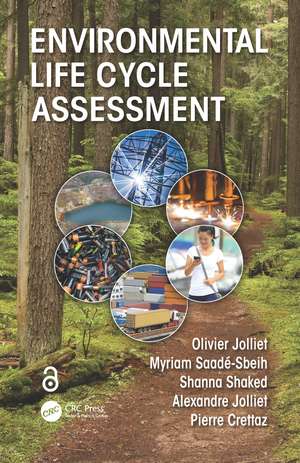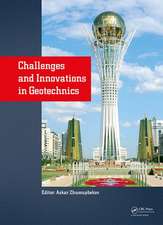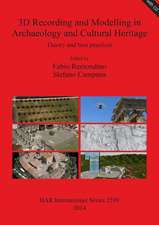Environmental Life Cycle Assessment
Autor Olivier Jolliet, Myriam Saade-Sbeih, Shanna Shaked, Alexandre Jolliet, Pierre Crettazen Limba Engleză Hardback – 9 dec 2015
In addition, readers will learn how to:
- Use consistent criteria to realize and evaluate an LCA independently of individual interests
- Understand the LCA methodology and become familiar with existing databases and methods based on the latest results of international research
- Analyze and critique a completed LCA
- Apply LCA methodology to simple case studies
Preț: 949.78 lei
Preț vechi: 1158.27 lei
-18% Nou
Puncte Express: 1425
Preț estimativ în valută:
181.74€ • 190.26$ • 150.38£
181.74€ • 190.26$ • 150.38£
Carte tipărită la comandă
Livrare economică 05-19 aprilie
Preluare comenzi: 021 569.72.76
Specificații
ISBN-13: 9781439887660
ISBN-10: 1439887667
Pagini: 332
Ilustrații: 170 b/w images
Dimensiuni: 156 x 234 x 23 mm
Greutate: 0.57 kg
Ediția:1
Editura: CRC Press
Colecția CRC Press
ISBN-10: 1439887667
Pagini: 332
Ilustrații: 170 b/w images
Dimensiuni: 156 x 234 x 23 mm
Greutate: 0.57 kg
Ediția:1
Editura: CRC Press
Colecția CRC Press
Public țintă
Academic and Professional Practice & DevelopmentCuprins
Introduction. General Principles of Life Cycle Assessment. Goal and System Definition. Inventory Analysis of Emissions and Extractions. Life Cycle Impact Assessment. Interpretation. Conclusions and Key Points. LCA through Example from A to Z: Treating Urban Sewage Sludge. Metacomparison of the Life Cycle Environmental Impacts of Bio-Based Products. Appendices. Glossary. References.
Notă biografică
Olivier Jolliet is professor in life cycle impact and risk modeling at the Department of Environmental Health Sciences in the School of Public Health, University of Michigan. He is also one of the founders of Quantis-International, which provides life cycle assessment (LCA) expertise to companies and governments and is one of the two co-initiators of the UNEP-SETAC Life Cycle Initiative. Dr. Jolliet has been one of the pioneers in developing LCA and applying it to food sustainability and innovative technologies since the early 1990s, He has developed comprehensive Life Cycle Impact Assessment Methods, such as the IMPACT2002 method He has authored or coauthored 150 peer-reviewed publications and book chapters.
Myriam Saadé-Sbeih earned her PhD in environmental sciences from the University of Lausanne, Switzerland, in 2011, after working for two years in the Life Cycle System group of Professor Jolliet at the Swiss Federal Institute of Technology, Lausanne. She is currently a research fellow at the Graduate Institute of International and Development Studies in Geneva, Switzerland, and since 2012 has been the scientific coordinator of a research program on the transboundary Orontes River basin, funded by the Swiss Development and Cooperation Agency. Her research focuses on human–hydrosystem coevolution in uncertain contexts, especially in the Middle East.
Shanna Shaked is lecturer in the departments of Physics & Astronomy and Environmental Science at the University of California – Los Angeles, teaching LCA and physics. She serves on the UCLA Physical Sciences Undergraduate Education Committee to improve undergraduate teaching using evidence-based techniques. She earned her PhD in applied physics from the University of Michigan in 2011 after receiving her BS and BA in physics, astronomy, and mathematics from the University of Arizona in 2002. She received her MA in teaching from Ithaca College in 2013. She is passionate about making quality education available to all and helping more people assess the global impacts of their actions.
Alexandre Jolliet is a student in the College of Literature, Science, and the Arts at the University of Michigan, where he is studying political science and philosophy with specializations in political economy and development, political philosophy, and ethics. He spends his summers teaching courses to Spanish secondary school students preparing for their Cambridge English: First (FCE) exams at English Summer International Schools in Tarragona, Spain.
Pierre Crettaz earned his PhD in environmental engineering at the Swiss Federal Institute of Technology in Lausanne in 2000. Between 2000 and 2005, he worked as a senior scientist at the Swiss Federal Office of Public Health and was responsible for the registration of pesticides with respect to their human health effects. He obtained his MSc in applied toxicology at the University of Surrey in Guildford. He is currently the head of the biocides section at the Swiss Federal Office of Public Health. He represents Switzerland in committees on biocides and is responsible for the risk assessment of biocidal products.
Myriam Saadé-Sbeih earned her PhD in environmental sciences from the University of Lausanne, Switzerland, in 2011, after working for two years in the Life Cycle System group of Professor Jolliet at the Swiss Federal Institute of Technology, Lausanne. She is currently a research fellow at the Graduate Institute of International and Development Studies in Geneva, Switzerland, and since 2012 has been the scientific coordinator of a research program on the transboundary Orontes River basin, funded by the Swiss Development and Cooperation Agency. Her research focuses on human–hydrosystem coevolution in uncertain contexts, especially in the Middle East.
Shanna Shaked is lecturer in the departments of Physics & Astronomy and Environmental Science at the University of California – Los Angeles, teaching LCA and physics. She serves on the UCLA Physical Sciences Undergraduate Education Committee to improve undergraduate teaching using evidence-based techniques. She earned her PhD in applied physics from the University of Michigan in 2011 after receiving her BS and BA in physics, astronomy, and mathematics from the University of Arizona in 2002. She received her MA in teaching from Ithaca College in 2013. She is passionate about making quality education available to all and helping more people assess the global impacts of their actions.
Alexandre Jolliet is a student in the College of Literature, Science, and the Arts at the University of Michigan, where he is studying political science and philosophy with specializations in political economy and development, political philosophy, and ethics. He spends his summers teaching courses to Spanish secondary school students preparing for their Cambridge English: First (FCE) exams at English Summer International Schools in Tarragona, Spain.
Pierre Crettaz earned his PhD in environmental engineering at the Swiss Federal Institute of Technology in Lausanne in 2000. Between 2000 and 2005, he worked as a senior scientist at the Swiss Federal Office of Public Health and was responsible for the registration of pesticides with respect to their human health effects. He obtained his MSc in applied toxicology at the University of Surrey in Guildford. He is currently the head of the biocides section at the Swiss Federal Office of Public Health. He represents Switzerland in committees on biocides and is responsible for the risk assessment of biocidal products.
Recenzii
"This is a very clear, comprehensive and well-structured textbook on LCA ... The book covers all the main elements and issues of LCA and the scope is just right for people with intermediate or no LCA knowledge."
—Roland Geyer, Bren School of Environmental Science and Management, University of California at Santa Barbara, USA
"This new book by Jolliet and colleagues will be a valuable addition to the existing LCA textbooks. It is presented in a very easy-to-read, lucid style making it useful even for beginners. However, it also contains the necessary information for advanced users. The coverage of topics is comprehensive and up-to-date. Starting from the very basic 'steps of LCA' which are clearly explained, advanced topics such as input-output analysis, uncertainty analysis and data quality are all covered. Examples, highlighting of key ideas and exercises at the end of the chapters add value."
—Professor Shabbir H. Gheewala, The Joint Graduate School of Energy and Environment, Thailand
"… the text is written in an easy to follow style… easy to read and contains pretty much everything that a newcomer (and a not so newcomer) needs to know to successfully conduct an environmental LCA. … and authorship by Professor Jolliet is in itself a credential for this book."
—Ivan Muñoz Ortiz, International Life Cycle Academy, Spain
—Roland Geyer, Bren School of Environmental Science and Management, University of California at Santa Barbara, USA
"This new book by Jolliet and colleagues will be a valuable addition to the existing LCA textbooks. It is presented in a very easy-to-read, lucid style making it useful even for beginners. However, it also contains the necessary information for advanced users. The coverage of topics is comprehensive and up-to-date. Starting from the very basic 'steps of LCA' which are clearly explained, advanced topics such as input-output analysis, uncertainty analysis and data quality are all covered. Examples, highlighting of key ideas and exercises at the end of the chapters add value."
—Professor Shabbir H. Gheewala, The Joint Graduate School of Energy and Environment, Thailand
"… the text is written in an easy to follow style… easy to read and contains pretty much everything that a newcomer (and a not so newcomer) needs to know to successfully conduct an environmental LCA. … and authorship by Professor Jolliet is in itself a credential for this book."
—Ivan Muñoz Ortiz, International Life Cycle Academy, Spain
Descriere
From raw materials through materials processing, manufacture, distribution, use, and disposal or recycling, this self-learning textbook demonstrates how to conduct environmental assessments for products throughout their entire life cycles. The authors describe the inventory databases and methods used around the world, and detail various impact assessment methodologies for North America, Asia, and Europe. The text also includes case studies and exercises illustrating how LCA and ISO standards are applied in practice. It systematically covers goal and scope, life cycle inventory, impact assessment, and interpretation.


















